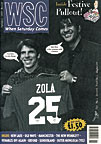 Mike Ticher explains why Terry Venables' appointment as Australia's new manager caused as much consternation there as it did here
Mike Ticher explains why Terry Venables' appointment as Australia's new manager caused as much consternation there as it did here
Australia fulfils an odd role in Britain’s unofficial list of foreign stereotypes these days. Because the vast majority of its inhabitants are white, it’s become one of the last places on earth which the so-called quality press, as well as the tabloids, feel free to patronize without fear of being called racist. What’s more, there’s a vast lexicon of symbols associated with Australia and Australians which are instantly recognizable to British people: marsupials; soap operas; conspicuous alcohol consumption; comical words and phrases; boomerangs; the bush; most of the words to Waltzing Matilda.
All of these familiar props were wheeled out with monotonous regularity as soon as it became apparent that the appointment of Terry Venables as national coach to the Australian team was not a joke. Alan Hubbard, sports editor of the Observer no less, was by no means alone in indulging in mindless generalizations. “Venables will get on well with the Aussies,” he wrote. “He speaks their language, likes a drink and a sing- song . . . Australians are good winners (though unbearable losers), naturally talented athletes and quick learners.” It’s not the kind of thing a senior writer on a supposedly liberal paper would write about West Indian cricketers these days, or African footballers.
Nor, come to that, what anyone would write about Australians if the sport in question were cricket or rugby league. For the condescending tone of most of the reports about Venables’ appointment had a double edge. Their authors clearly felt they had licence to talk down to Australians in general only because they could also be derisive about the standard of their football. The job, it was generally felt, was way beneath him.
In fact, being coach of the Socceroos is probably one of the most fascinating and challenging jobs in world football today. The standard of Australia’s players is rising fast enough that they could reasonably expect to put a few noses out of joint at a World Cup. (So fast, in fact, that former third-choice national goalkeeper Mark Schwarzer was happy to turn down a move to Manchester City in November, although perhaps that’s a bad example . . .) Venables’ predecessor as coach, Eddie Thomson, got the team to the point of being hard to beat, without ever suggesting that he could lift them to any more inspiring challenges. Thomson too often gave the impression of being satisfied with results like the 1-0 defeat against England in 1991 and the 2-1 aggregate loss to Argentina in the 1994 World Cup qualifying play-off.
Venables is the type of coach who could expect to get more out of the same players, especially as they gain more experience in Europe. With virtually the whole of the first-choice squad now playing outside Australia, the challenges of team-building make even Brazil’s look piddling by comparison. In fact Australia now virtually operates two national teams, one composed almost entirely of home-based players for friendlies and other minor games, and one of exiles, for World Cup qualification. That fact was one reason why the choice of Venables was heavily criticized in some parts of the Australian media and by a majority of national league coaches.
By spending only four months of the year in the country, he could hardly expect to be properly up to speed on the local players on the fringes of the national squad. For his first visit to Australia, for a four-match tournament in January, only three overseas-based players are likely to be available. The other major concern was that Australia had succumbed yet again to the ‘cultural cringe’, the inferiority complex which for so long rated British mediocrity above home-grown talent – a mirror-image of the British media’s view of Australia. It is not a term often applied to most sports, where all things English tend to be treated with contempt, but in football there is a long tradition of importing second-rate players, and more particularly coaches, from Britain.
That included two disastrous national team appointments in the 1970s, Brian Green and Jimmy Shoulder. Green fled back to obscurity in Britain after being found guilty of shoplifting LPs, while Shoulder’s team failed to qualify for the 1978 World Cup after losing home and away to Iran and Kuwait. Australian soccer has come a long way since then, but the virtue of self-reliance is obsessively guarded by those who remember such indignities.
While for the British press the appointment of Venables is a joke, for Soccer Australia, formerly the National Soccer Federation, and its combative chairman David Hill it’s a major gamble. Hill is a former head of the ABC (the equivalent of the BBC), who was brought in to sweep away the in-fighting and cronyism which plagued previous administrations. His no-holds-barred style tends to make as many enemies as it does friends – he has already upset many of the clubs by forcing them to get rid of the last remnants of official recognition of their ethnic origins, in their club badges and stadium advertising.
Appointing Venables has raised the stakes for everyone. It’s costing the federation an awful lot of money (which they hope will partly be recouped by the impact of Venables’ higher profile) and even an exit at the group stage in the World Cup will be seen as failure. Hill has put himself in a position where he will live or die by the success of Venables. He’s a brave man.
From WSC 119 January 1997. What was happening this month